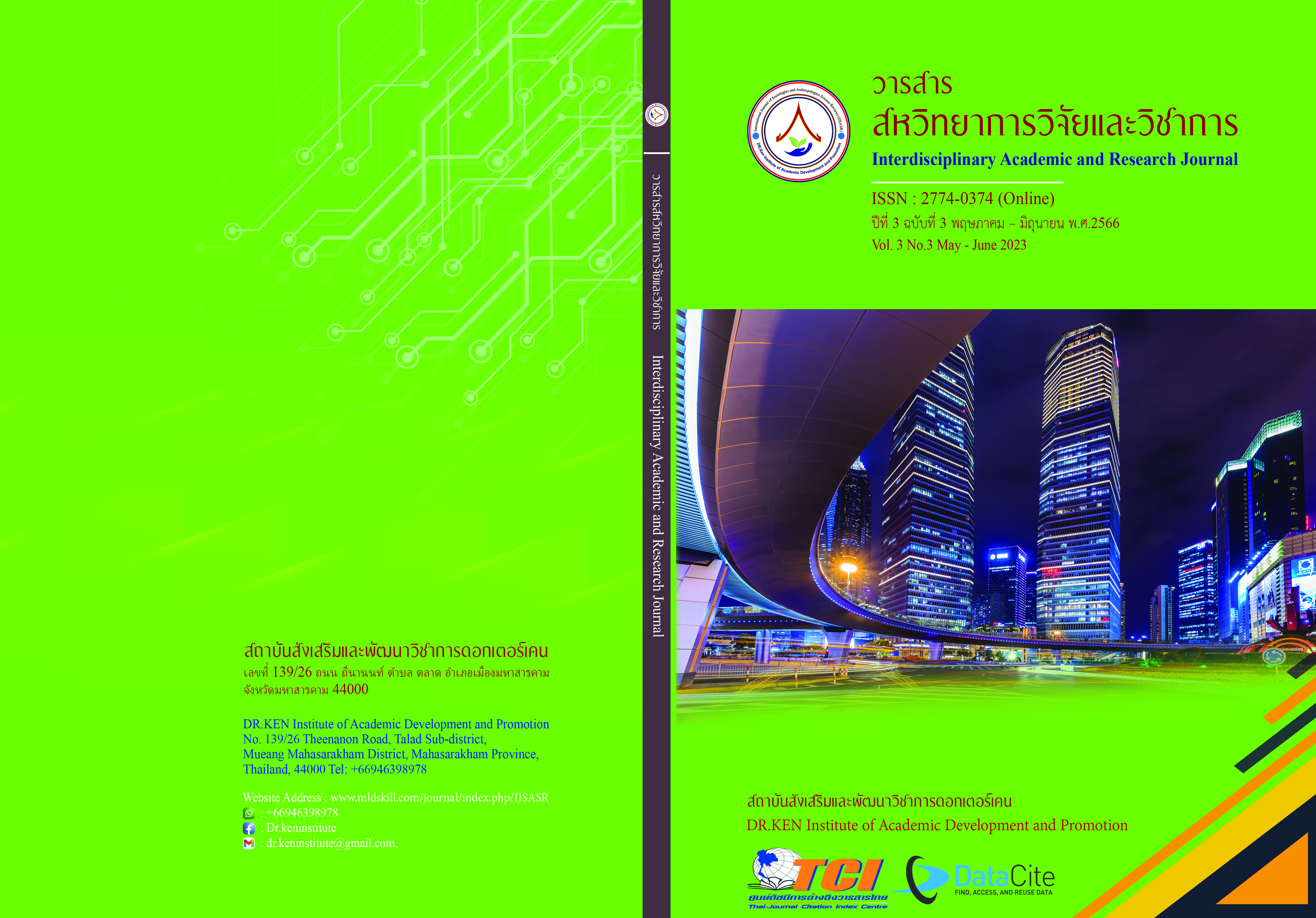Developing a Learning Management Model to Promote the Problem-solving Capabilities Analytical for 6th Graders
DOI:
https://doi.org/10.14456/iarj.2023.116Keywords:
Format; , Solving Analytical Problems; , MathematicsAbstract
Educational management in the 21st century requires the development of human resources to have important skills to cope with future life changes, to develop human resource potential based on multiple intelligences, teachers need to consider how to manage learning that can answer important questions. Therefore, this research has an objective; (1) To study basic information and necessary needs in developing a learning management model to promote the analytical problem-solving ability of Prathom Suksa 6 students. (2) To develop a learning management model to promote the analytical problem-solving abilities of Prathom Suksa 6 students. (3) To study the effect of using a learning management model to promote the ability to solve analytical problems of Prathom Suksa 6 students with the criteria of 70 percent. The key informants were 10 mathematics teachers at the Grade 6 level in the academic year 2021, the educational supervisors who are responsible for the mathematics learning group of 2 people, and 18 students in Prathomsuksa 6 at Kok Prasit Wittaya School. The research tools are (1) a recording group discussion, (2) a learning management model, (3) a learning management plan, (4) a problem-solving ability test, and (5) a satisfaction assessment form for learning management. The statistics used for analysis were frequency, percentage, mean, standard deviation, and t-test (Dependent Samples). The results showed that; (1) The problem condition of the student group found that the students could not know how to solve the problem, the problematic condition of the teachers found that the teachers still held themselves as the main importance in learning management, And the problems of service providers and educational supervisors found that lack of organization of various learning activities, lack of teaching for analytical thinking, and lack of administrators participation in the teaching and learning development process. (2) The learning management model for promoting the ability to solve analytical problems has 8 components, namely; (a) the background and significance of the form, (b) Theoretical concepts involved in the development of the model, (c)Principles of the model, (d)Purpose of the model, (e)Steps of the model, (f)Social system, (g) Response principle, (h)Support system. (3) The results of the evaluation of the effectiveness of the learning management model to promote the ability to solve analytical problems using teaching and learning activities according to the 80/80 criterion found that: Efficiency is 83.26/81.53, which is above the set criteria and is at the optimum level, and all items are at the highest level of efficiency. And the result of using the learning management model to promote the ability to solve analytical problems of Prathom Suksa 6 students was 81.53, which was higher than the established criteria.
References
กระทรวงศึกษาธิการ. (2551). หลักสูตรแกนกลางการศึกษาขั้นพื้นฐานพุทธศักราช 2551. กรุงเทพฯ: กระทรงศึกษาธิการ.
กระทรวงศึกษาธิการ. (2553). หลักสูตรแกนกลางการศึกษาขั้นพื้นฐาน พุทธศักราช 2551. พิมพ์ครั้งที่ 3.กรุงเทพฯ : โรงพิมพ์ชุมนุม สหกรณ์การเกษตรแห่งประเทศไทย.จ ากัด.
กัญชร มัททวีวงศ์. (2557). การพัฒนารูปแบบการเรียนการสอนด้วยระบบการตอบสนองในชั้นเรียนผ่านแท็บเล็ตโดยใช้ปัญหาเป็นหลัก เพื่อพัฒนาความสามารถในการแก้ปัญหาทางคณิตศาสตร์สำหรับนักเรียนระดับมัธยมศึกษา. ปรัชญาดุษฎีบัณฑิต (เทคโนโลยีการศึกษา) กรุงเทพ : มหาวิทยาลัยรามคำแหง,
ไชยยศ เรืองสุวรรณ. (2526). เทคโนโลยีทางการศึกษา (หลักการและแนวปฏิบัติ).กรุงเทพฯ : วัฒนาพานิช.
ทวีศักดิ์ เจริญเตีย (2556). การพัฒนารูปแบบการจัดการเรียนรู้กลุ่มสาระการเรียนรู้คณิตศาสตร์ที่ส่งเสริมความสามารถในการคิดแก้ปัญหาโดยใช้ทฤษฎีปัญญาแห่งความสำเร็จของสเติร์นเบอร์ก. วิทยานิพนพ์ครุศาสตรดุษฎีบัณฑิต (การบริหารการศึกษา) มหาวิทยาลัยบุรพา.
พาวา พงษ์พันธุ์. (2559). การพัฒนารูปแบบการจัดการเรียนรู้เพื่อส่งเสริมความสามารถในการเชื่องโยงความรู้ทางคณิตศาสตร์ของนักเรียนมัธยมศึกษาปีที่ 2. บัณฑิตวิทยาลัย คณะศึกษาศาสตร์ ชลบุรี : มหาวิทยาลัยบูรพา,
โรงเรียนโคกประสิทธิ์วิทยา. (2562). รายงานการจัดการศึกษา ประจำปีการศึกษา 2561. กาฬสินธุ์ : โรงเรียนโคกประสิทธิ์วิทยา สำนักงานเขตพื้นที่การศึกษาประถมศึกษากาฬสินธุ์ เขต 2,
วิจิตตรา จันทร์ศิริ. (2559). การพัฒนารูปแบบการจัดประสบการณ์การเรียนรู้โดยใช้สมองเป็นฐานเพื่อส่งเสริมทักษะพื้นฐานทางคณิตศาสตร์ของเด็กปฐมวัย. บัณฑิตวิทยาลัย คณะศึกษาศาสตร์ ชลบุรี : มหาวิทยาลัยบูรพา,
ศิรินันทน์ ว่องโชติกุล. (2559). การพัฒนารูปแบบการสอนคณิตศาสตร์โดยใช้สมองเป็นฐานระดับประถมศึกษา. บัณฑิตวิทยาลัย คณะศึกษาศาสตร์ ชลบุรี : มหาวิทยาลัยบูรพา,
สำนักงานเลขาธิการสภาการศึกษา. (2564). รายงานการสังเคราะห์สภาวการณ์และปัจจัยที่ส่งผลต่อคุณภาพการศึกษาไทย. กรุงเทพฯ : สำนักงานเลขาธิการสภาการศึกษา กระทรวงศึกษาธิการ.
สุนทรีย์ ปาลวัฒน์ชัย. (2559). การพัฒนารูปแบบการจัดการเรียนรู้ตามแนวทฤษฎีการสร้างความรู้เพื่อส่งเสริมสมรรถภาพทางคณิตศาสตร์ของนักเรียนชั้น มัธยมศึกษาปีที่ 1. ดุษฎีนิพนธ์ บัณฑิตวิทยาลัย คณะศึกษาศาสตร์ ชลบุรี : มหาวิทยาลัยบูรพา,
Ausubel, D. P. (1963). The psychology of meaningful verbal learning. Grune & Stratton.
Bandura, A. (1997). Self-efficacy: The exercise of control. W H Freeman/Times Books/ Henry Holt & Co.
Bandura, A. (1986). Social foundations of thought and action: A social cognitive theory. Englewood Cliffs, New Jersey: Prentice-Hall.
Piaget, J. (1960). The child’s conception of the world. Joan and Andrew Tomlinson. Fran, Paterson, N.J.: Little Field, Adams
Piaget, J. (1962). The Origins of Intelligence in Children. New York: Norton Good.
Polya, G., (1975). How to Solve It. New York: Doubleday and Company, Inc.
Downloads
Published
How to Cite
Issue
Section
License
Copyright (c) 2023 Jukkapun Nathongchai, Samarn Ekkapim, Poosit Boontongtherng

This work is licensed under a Creative Commons Attribution-NonCommercial-NoDerivatives 4.0 International License.
Copyright on any article in the Interdisciplinary Academic and Research Journal is retained by the author(s) under the under the Creative Commons Attribution-NonCommercial-NoDerivatives 4.0 International License. Permission to use text, content, images, etc. of publication. Any user to read, download, copy, distribute, print, search, or link to the full texts of articles, crawl them for indexing, pass them as data to software, or use them for any other lawful purpose. But do not use it for commercial use or with the intent to benefit any business.
















.png)


